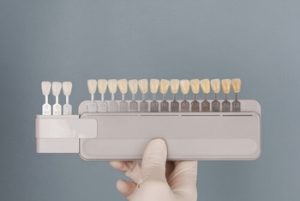In the realm of cosmetic dentistry, achieving a perfect smile is often at the forefront of many patients’ aesthetic goals. Among the various options available, zirconia veneers vs. porcelain veneers became one of the main debates. Understanding the characteristics, benefits, and maintenance of these veneer materials can empower you to make informed decisions about enhancing your smile.
This comprehensive guide will explore what zirconia veneers and porcelain veneers are, delve into other types of veneers such as composite resin veneers, minimal preparation veneers, and temporary veneers, and discuss the reasons why many patients often prefer porcelain veneers. Additionally, we’ll outline what to expect when getting veneers and how to care for them.
Porcelain Veneers Vs. Zirconia Veneers: Overview

These shells are custom-made in a dental clinic and are designed to cover the front surface of the teeth, enhancing their overall appearance.
Porcelain dental veneers are made of a thin layer of feldspathic porcelain, a ceramic material that closely mimics the natural tooth enamel and structure.
These veneers are also custom-made in a dental lab, tailored to each patient’s specific tooth shape and colour preferences. Porcelain veneers are hailed for their ability to provide a more natural appearance and aesthetic appeal without compromising durability.
Other Types Of Veneers
In addition to zirconia and porcelain veneers, several other types of veneers are available, each catering to different cosmetic needs and preferences.
Composite Resin Veneers
Composite veneers are made up of plastic and glass particles. These veneers are often put directly to the teeth in a single visit, making them a more cost-effective and rapid choice for improving your smile.
However, they may not be as durable or stain-resistant as zirconia or porcelain veneers.
No-Prep Veneers
No-prep veneers, also known as minimal preparation veneers, require little to no shaving down of the natural tooth structure, such as Lumineers, Durathin veneers, and Vivaneeers.
This technique preserves more of the original tooth enamel, making it an appealing option for those who want to maintain their natural tooth structure while enhancing their smile.
No-prep veneers are especially beneficial for patients with minimal cosmetic concerns, as they can provide an effective solution without significantly altering the natural tooth.
Temporary Veneers
Temporary veneers are typically made from acrylic or composite materials and are used as a short-term solution while permanent veneers are being crafted.
They provide a temporary aesthetic improvement and protect the teeth during the waiting period.
Zirconia Veneers Vs. Porcelain Veneers: Which Is Better?
While both zirconia and porcelain veneers have unique benefits, many patients prefer them for several reasons.
Aesthetics
Porcelain veneers are often considered because they have a more natural appearance thanks to their light-reflecting properties, which mimic natural teeth.
This aesthetic quality is specifically important for visible teeth in the front of the mouth, where appearance plays a crucial role in a person’s overall smile.
Tooth Preservation
Porcelain veneers typically require less tooth reduction than zirconia veneers and other treatments like dental crowns. This means that more natural tooth structure and enamel can be preserved, a significant consideration for many patients seeking to maintain their oral health.
Comfort And Fit
Porcelain veneers should fit better than zirconia veneers. The thinner porcelain profile can produce a more natural feel, allowing for better adaptation and comfort.
Lasting Quality

While zirconia veneers are also long-lasting, they do not bond as effectively as porcelain due to their resistance to sticking to tooth surfaces with cement. This may lead to a higher chance of debonding over time.
What To Expect When Getting Veneers
If you are thinking of veneers as a cosmetic dentistry option, it’s important to understand the process involved in getting them.
Initial Consultation
The first step in the veneer process is an initial consultation with an experienced dentist.
During this appointment, your dental expert will consider your cosmetic goals, review your oral health, and determine if veneers are the right option. X-rays or scans may be taken to examine the condition of your teeth and gums.
Treatment Planning
A treatment plan will be established once you and your dentist decide to proceed. This may include selecting the type of veneers, shade matching, and discussing the preparation needed for your teeth.
Tooth Preparation
Tooth preparation involves minimal reductions to the natural tooth structure to accommodate the veneer.
This step is paramount for ensuring a proper fit and achieving the desired aesthetic results. Your dentist will ensure that as little tooth enamel is removed as possible.
Impressions And Fabrication
After preparation, impressions of your teeth will be taken to create a precise model for your veneers. These impressions are forwarded to a dental lab, where your custom veneers will be fabricated.
Temporary Veneers
While your permanent veneers are being designed, you may receive temporary veneers to safeguard your teeth and enhance your smile. These temporary veneers will be removed once the permanent ones are ready.
Bonding The Veneers
Once your veneers are ready, you will return to your dentist’s office for bonding.
Your dental expert will carefully place the veneers on your teeth and make any necessary modifications to achieve a snug fit and natural appearance. A specific dental adhesive will then bond the veneers securely to your teeth.
Follow-Up Visits
After the bonding process, follow-up visits may be scheduled to observe your progress, ensure the veneers function correctly, and maintain their aesthetic appeal.
How To Take Care Of A Porcelain Veneer
Taking care of any veneers is key to maintaining their appearance and longevity. Proper care ensures that your veneers continue to look great and function effectively for many years. Here are some key tips for caring for your porcelain veneers:
Maintain Good Oral Hygiene
Like natural teeth, porcelain veneers require regular brushing and flossing to keep your mouth healthy. Utilise a soft-bristled toothbrush and fluoride toothpaste to brush your teeth at least twice a day gently.
Floss as recommended to get rid of plaque and food particles from between teeth and around the gum line, ensuring your oral health remains in check.
Limit Staining Foods And Drinks
While porcelain veneers are stain-resistant, it is wise to limit your foods and beverages known to cause discolouration, such as coffee, tea, red wine, and dark sauces.
If you indulge, rinsing your mouth with water afterwards can help minimise staining.
Schedule Regular Dental Check-ups
Sticking to dental visits as recommended is crucial for maintaining your porcelain veneers. Schedule check-ups when needed to ensure your oral health is on track and handle any concerns about your veneers.
Your dental expert can assess the condition of your veneers and provide professional cleaning to keep them looking their best.
Use Non-Abrasive Products
When choosing dental hygiene products, opt for non-abrasive toothpaste and mouthwash to avoid damaging the surface of your porcelain veneers.
Avoid using whitening products, as they can cause uneven results and may harm the integrity of the veneer material.
Frequently Asked Questions
How long do porcelain veneers last?
With proper care, porcelain veneers can last around 10 to 15 years. Regular dental check-ups and good oral hygiene practices can help prolong their lifespan.
Are there any risks associated with getting veneers?

Can I still get cavities with porcelain veneers?
While porcelain veneers cannot decay, the natural teeth beneath them can still develop cavities. Good oral hygiene is essential to prevent tooth decay around the edges of the veneers.
Reflecting On Your Veneer Options: What’s Best For You?
Choosing between zirconia veneers vs. porcelain veneers is a personal decision that depends on your aesthetic goals and dental needs. While both options have unique benefits, porcelain veneers are often preferred for their natural appearance and minimal tooth preparation.
With proper care and attention, veneers can give you a stunning smile that enhances your natural beauty.
If you’re considering veneers, our experienced dental team in Winston Hills is here to help! Contact Infinity Dental Care today at (02) 9159 6237 to book an appointment. Together, we’ll discuss your cosmetic goals and create a personalised treatment plan that meets your needs.
Sources:
Healthdirect Australia. Veneers [Internet]. Healthdirect. 2023 [cited 2024 Oct 4]. Available from: https://www.healthdirect.gov.au/veneers
Manolis A. 4 Types of Veneers [Internet]. NewMouth. 2024 [cited 2024 Oct 4]. Available from: https://www.newmouth.com/dentistry/cosmetic/veneers/types/
Baluch A. How Long Do Veneers Last? What to Expect [Internet]. Forbes Health. 2024 [cited 2024 Oct 4]. Available from: https://www.forbes.com/health/dental/how-long-do-veneers-last/
Sahi A. Dental Veneers: Procedure and Safety [Internet]. News Medical. 2023 [cited 2024 Oct 4]. Available from: https://www.news-medical.net/health/Dental-Veneers-Procedure-and-Safety.aspx
Editorial Team. 5 Tips on Taking Care of Your Veneers [Internet]. Meds News – Health And Medicine Information. 2023 [cited 2024 Oct 4]. Available from: https://www.medsnews.com/health/5-tips-on-taking-care-of-your-veneers/

